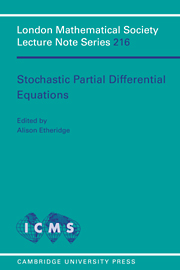Book contents
- Frontmatter
- Contents
- Foreword
- List of participants
- Stochastic differential equations with boundary conditions and the change of measure method
- The Martin boundary of the Brownian sheet
- Neocompact sets and stochastic Navier-Stokes equations
- Numerical experiments with S(P)DE's
- Contour processes of random trees
- On a class of quasilinear stochastic differential equations of parabolic type: regular dependence of solutions on initial data
- Fluctuations of a two-level critical branching system
- Non-persistence of two-level branching particle systems in low dimensions
- The stochastic Wick-type Burgers equation
- A weak interaction epidemic among diffusing particles
- Noise and dynamic transitions
- Backward stochastic differential equations and quasilinear partial differential equations
- Path integrals and finite dimensional filters
- A skew-product representation for the generator of a two sex population model
- A nonlinear hyperbolic SPDE: approximations and support
- Statistical dynamics with thermal noise
- Stochastic Hamilton-Jacobi equations
- On backward filtering equations for SDE systems (direct approach)
- Ergodicity of Markov semigroups
Statistical dynamics with thermal noise
Published online by Cambridge University Press: 04 August 2010
- Frontmatter
- Contents
- Foreword
- List of participants
- Stochastic differential equations with boundary conditions and the change of measure method
- The Martin boundary of the Brownian sheet
- Neocompact sets and stochastic Navier-Stokes equations
- Numerical experiments with S(P)DE's
- Contour processes of random trees
- On a class of quasilinear stochastic differential equations of parabolic type: regular dependence of solutions on initial data
- Fluctuations of a two-level critical branching system
- Non-persistence of two-level branching particle systems in low dimensions
- The stochastic Wick-type Burgers equation
- A weak interaction epidemic among diffusing particles
- Noise and dynamic transitions
- Backward stochastic differential equations and quasilinear partial differential equations
- Path integrals and finite dimensional filters
- A skew-product representation for the generator of a two sex population model
- A nonlinear hyperbolic SPDE: approximations and support
- Statistical dynamics with thermal noise
- Stochastic Hamilton-Jacobi equations
- On backward filtering equations for SDE systems (direct approach)
- Ergodicity of Markov semigroups
Summary
Abstract
We consider how to add noise to a non-linear system in a way that obeys the laws of thermodynamics. We treat a class of dynamical systems which can be expressed as a (possibly non-linear) motion through the set of probability measures on a sample space. Thermal noise is added by coupling this random system to a heat-particle distributed according to a Gibbs state. The theory is illustrated by the Brussellator, where it is shown that the noise converts a limit cycle into a global attractor. In the linear case it is shown that every Markov chain with transition matrix close to the identity is obtained by coupling to thermal noise with a bistochastic transition matrix.
Motivation
Suppose that we have a dynamical system whose (non-linear) equations depend on a parameter λ, and that there is a bifurcation to periodicity or chaos as we increase λ up to a critical value λ0. It is then interesting to add noise to the system, and to ask whether this induces the system to bifurcate earlier, at some λ < λ0, or whether it delays the onset until λ > λ0. It might on the other hand change the nature of the criticality, of destroy it altogether.
Here we report on a study (made with L. Rondoni) of the chemical system known as the Brussellator modified to follow the activity-led law of mass action. For certain values of the rate constants the system exhibits a limit-cycle, which is converted into a global attractor when the system is coupled to thermal noise in a particular way.
Information
- Type
- Chapter
- Information
- Stochastic Partial Differential Equations , pp. 262 - 286Publisher: Cambridge University PressPrint publication year: 1995
